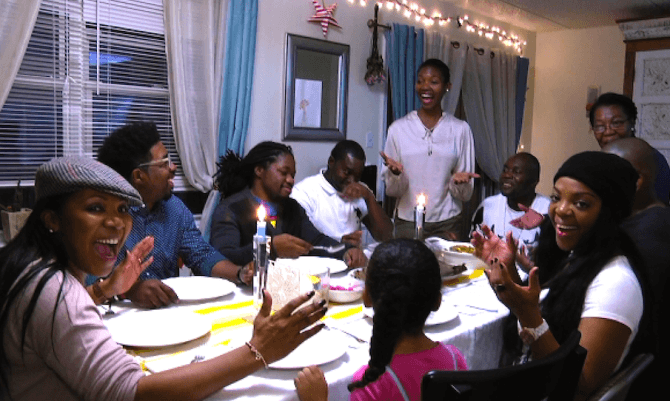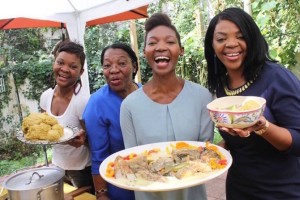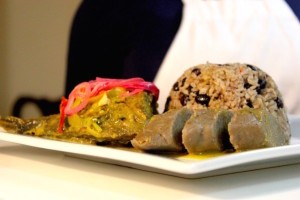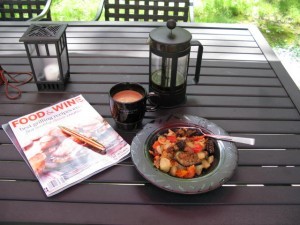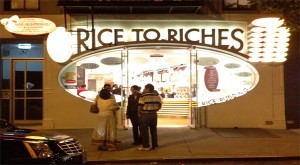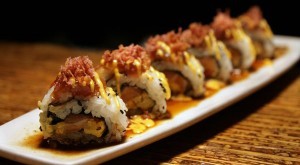All Black communities living on the Caribbean coast of Central America are called Garifuna or Black Carib, or as they refer to themselves, Garinagu. The Garinagu are the descendants of Caribs Indians and African Slaves. The Museum Of UnCut Funk and Cafe 70 celebrates the Garifuna feast.
The savory aromas of coconut fish stew, darasa (tamales made of green bananas, coconut milk and spices) and coconut rice and beans filled Isha Sumner’s East Harlem town house as she and her mother prepared a traditional Garifuna meal for family and friends.
For dessert, guests enjoyed bimekakule (sweet rice infused with cinnamon, nutmeg and brown sugar), and there was barely a morsel left over. Preparing traditional Garifuna meals has been a weekly occurrence ever since the mother-daughter duo started Weiga/Let’s Eat. The word weiga simply means, “let’s eat” in the Garifuna language.
Sumner and her mom Sara Martinez wanted to find a way to share their cherished culinary traditions beyond New York City’s Garifuna community. Their goal is to introduce Garifuna food to people throughout the city, and in so doing, to celebrate Garifuna culture, history and family through food.
“We are a nation of people who share a dynamic core when it comes to spoken language, music, dance, food, and traditions, but whose borders vary from country to country,” Sumner said. Descendants of indigenous tribes and Africans who settled Central America’s Caribbean coast, the Garinagu, plural for Garifuna, are from countries including Belize, Guatemala, Nicaragua and Honduras — the native country of Sumner and her family.
They have called New York City home for over 30 years and are a part of the largest concentration of Garinagu outside of Central America. In addition to hosting weekly dinners, Sumner, a personal stylist in her 40s and Martinez, a retired home health aide in her 60s, offer catering services and even make house calls to prepare private dinners by request. “I love to see everyone enjoying my food. When I cook for everyone I put love into it,” said Martinez.
Sumner says it was her mom and the way she was able to bring the whole family together through food that inspired the creation of Weiga/Let’s Eat. “Whenever she would say ‘ok I’m cooking’ then everybody would be like ‘ok I’m coming over.’ We have good times. It was always good times,” Sumner said.
The idea for this venture started after a family dinner in 2013. Sumner and her siblings were reminiscing about the many Garifuna meals they enjoyed while growing up in Honduras. The family created a list of all the dishes they could think of and Sumner searched for a Garifuna cookbook online but was disappointed with what she found. “There wasn’t one that actually showed the food in an elevated way that I wanted to see it, so I said ‘mom we should create a cookbook,’” Sumner explained.
Isha Sumner and her sister Gi Martinez decided to return home to Honduras that summer in search of recipes for Garifuna dishes they did not already know how to make. Obtaining these authentic recipes would be important additions to the Garifuna cookbook they wanted to create. It would be their first visit in seven years.
“Going back to Honduras is always exciting, but this time it was so much more exciting to be able to go back and pitch the idea of creating a cookbook to the folks cooking from home as a business and how they were an integral part of it,” Sumner said.
“First we went to our village of San Juan, where we were born, and spoke to some of the cooks we grew up with, buying certain ingredients from them because they made it best,” Sumner said. “We were refused by some but received by many with open arms,” she continued. The sisters described the trip as not only an adventure to find people who were willing to share recipes, but also the mission of introducing Garifuna food to people from other cultures.
Many traditional Garifuna foods are made using ingredients like coconut milk, garlic, basil, black pepper, green pepper and cumin. The varying combinations of these ingredients create dishes with rich and distinctive flavor.
Sumner explained that the unique flavor of coconut is the “DNA of Garifuna food” because so much of the cooking and baking revolves around this ingredient. Other staples include bananas and plantains, cassava and fish. “That’s Garifuna food… It’s cooked in a simple way but what’s so attractive about it is the flavors. There are no super spicy foods. It’s just plain, simple sustenance food,” said Sumner.
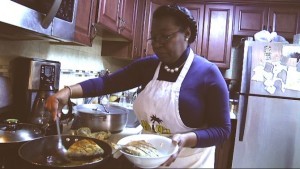 Once Sumner and her sister brought the new recipes back to New York they practiced and perfected them with their mother. And, instead of the traditional practice of passing recipes on orally, they wrote them down — something that took some getting used to for Martinez. “I don’t cook with measurements. I don’t know. I just cook…. so that was a challenge,” she said.
Once Sumner and her sister brought the new recipes back to New York they practiced and perfected them with their mother. And, instead of the traditional practice of passing recipes on orally, they wrote them down — something that took some getting used to for Martinez. “I don’t cook with measurements. I don’t know. I just cook…. so that was a challenge,” she said.
Before this Garifuna catering and event planning group got going, there was another challenge — convincing the family matriarch that she could do it. “The challenge for me was that she (Isha Sumner) always tells me ‘Mommy you know how to cook,’ but I was like ‘No I don’t believe that.’ But, she was insisting that I know how to cook because everybody in my family loves my food,” said Martinez. “So now every time we serve people they are happy and they come to me and say ‘I like it.’ This is so good, so I said ok, let’s do this. Let’s keep doing this.”
Now, as the mother-daughter venture approaches its three-year anniversary this summer, Sumner says she and her family are looking forward to the release of their long-anticipated cookbook by the same name. For them, the book will be an important way of preserving and passing on an important part of their culture.
“Food is an essential part of our culture. To be able to pass it on, not only the traditional way that our grandmothers did it, but to do it in more of a modern way where it’s written down, to me that’s very important,” Sumner said.
“That’s a way to keep the culture and also share it, not only in our community but to pass it on to those who are interested, to those who are open minded to new cultures. Garifuna food, Weiga!”
Source: Voices of NY

